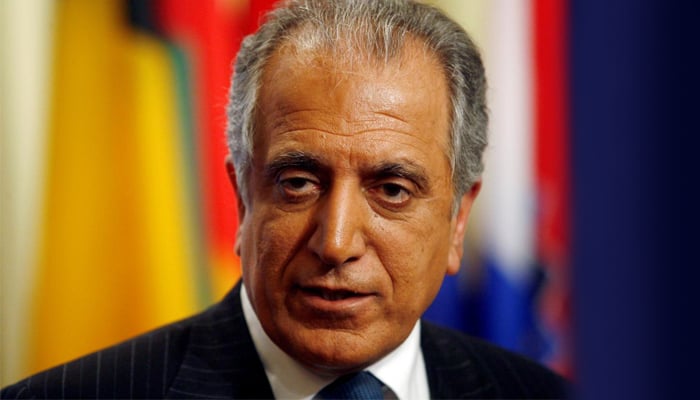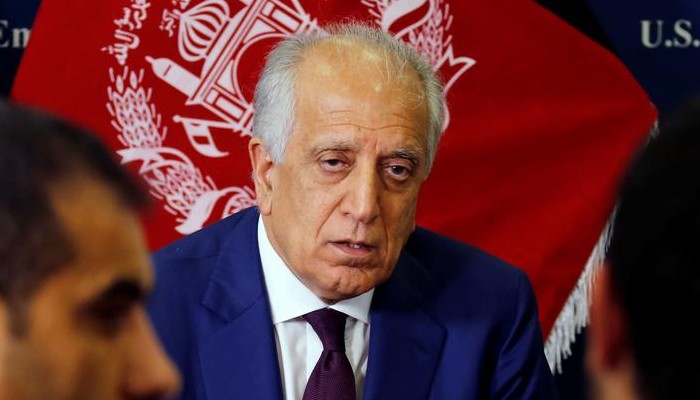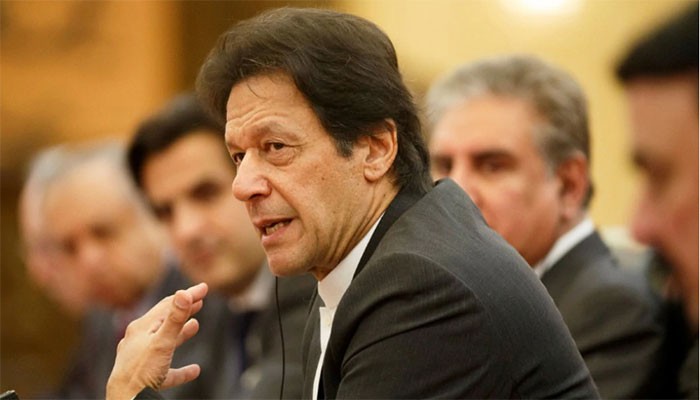'All will join in intra-Afghan dialogue in Doha,' says Khalilzad on future Taliban talks
April 08, 2019

WASHINGTON/KABUL: The United States' envoy for Afghan peace talks, Zalmay Khalilzad, said Sunday "men [and] women, young [and] not-so-young, all will join in intra-Afghan dialogue in Doha [and] eventual negotiations".
Ambassador Khalilzad, the US Special Representative for Afghanistan Reconciliation, posted the update on Twitter following a meeting with President Ashraf Ghani.
"Had important meeting with Pres @AshrafGhani today. We have momentum now with #Afghans working together across party & society.
"Look forward to meeting representatives soon," he tweeted.
In his full statement on Twitter, on the other hand, it was noted that Khalilzad discussed "how to ensure the intra-Afghan dialogue in Doha next week, in which representatives of the Afghan government and wider society will participate, can best advance our shared goal of accelerating a settlement process".
The topics, according to the statement, were discussed "with former President Karzai, leaders of the High Peace Council, and other prominent Afghans".
"Ambassador Khalilzad underscored the imperative of reducing violence across Afghanistan in the coming weeks and explored ways to build broader regional support for the current effort to realize the Afghan people's yearning for peace," it added.
Kabul to 'exchange views' with Taliban
Earlier, an official had confirmed that Afghanistan would send a delegation to "exchange views" with the Taliban in Qatar in an ongoing push to find a way out of the country's 17-year-old war.
Fresh talks are expected to take place in Doha later this month, where Taliban members are due to meet with Afghan officials and other stakeholders.
President Ghani's envoy for peace, Mohammad Omar Daudzai, said: "For now, an inclusive delegation will go (to the Qatari capital) on behalf of the Islamic Republic of Afghanistan and exchange views with the Taliban."
Daudzai stressed that the delegation will only serve to swap views with the Taliban, and its members would not necessarily be the same as a formal negotiating team.
Afghan officials, however, are set to meet on Wednesday to finalise delegates and decide who will comprise that official negotiating team.
Several rounds of talks
US and Taliban officials have held several rounds of talks but the militant group has so far refused to talk directly to the Afghan government, which they consider an illegitimate regime.
Discussions also took place between the Taliban and Afghani opposition groups in Moscow in February.
The Taliban had no immediate reaction to Daudzai's announcement, which comes after Khalilzad spent last week in Afghanistan as part of an ongoing push for a peace deal.
Khalilzad has repeatedly called on Ghani to form a strong negotiating team to reach a deal before the country's delayed presidential elections, now slated for September.
On Thursday, Afghan media outlet Tolo News had quoted Khalilzad as saying the relations between the US and Pakistan would not improve until Islamabad reconsiders its policies pertaining to Kabul.
The envoy of Washington had further highlighted that in addition to a potential peace deal between the Afghan Taliban and the US, Islamabad and Kabul, too, shall reach an agreement through which Pakistan would be able to play a more "a constructive role in Afghanistan".
“We … are seeking that an agreement should be reached between Afghanistan and Pakistan that can result in peace and (can stop) the interferences Pakistan has made in Afghanistan,” Khalilzad had said, as per the Afghan publication.
Urging Pakistan to play a more positive role, he said if Islamabad desires better ties with Washington, "their policy toward Afghanistan must change, otherwise, the US and Pakistan relations will not improve”.
On the other hand, however, Prime Minister Imran Khan had told Khalilzad on Friday during the latter's side trip to Pakistan that he had some "brotherly advice" for Afghanistan. He was quoted saying to the Pakistani journalists that the Afghan Taliban had wanted to meet him but Kabul protested so he did not do so.
Addressing a rally in Jamrud on Friday, Khan had explained his original comments as “brotherly advice” to the people and government of Afghanistan and said his comments should not be considered interference.
Kabul, nevertheless, was furious about the comment, and the Ministry of Foreign Affairs had summoned a Pakistan diplomat to explain the remarks.
“Afghanistan considers recent statements of Imran Khan explicit interference in internal affairs of Afghanistan and deems PM’s remarks a return to his previous stance,” Sibghatullah Ahmadi had tweeted.
This marked the fourth time in about a month and a half that Kabul has demanded an explanation from Islamabad for comments related to peace talks aimed at ending 17 years of war in Afghanistan.
Last month, Afghanistan had recalled its ambassador from Islamabad after Khan was quoted in the local media as suggesting the formation of an interim Afghan government that would smooth peace talks between US and Taliban officials since the Taliban refused to speak to the current government.














